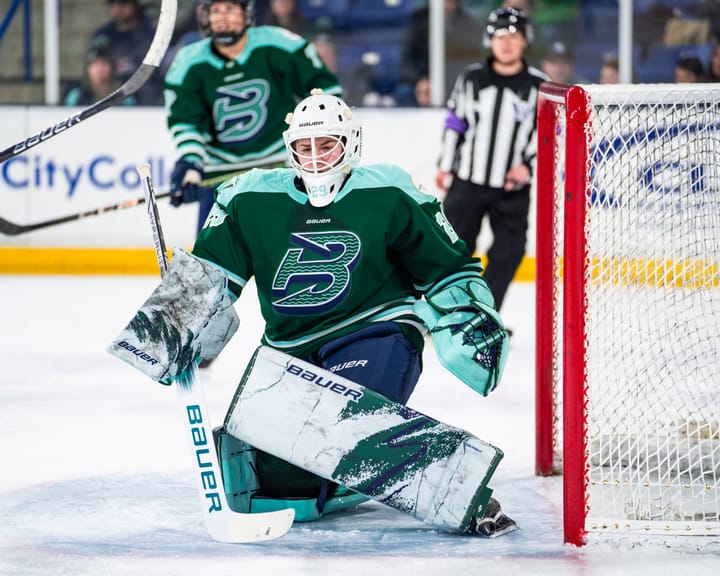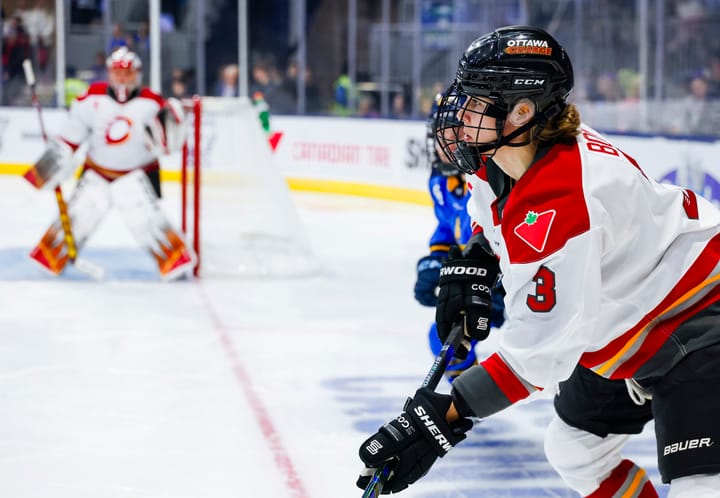Canadian players reflect on their journeys to PyeongChang
For Olympic rookies and veterans alike, the path to the 2018 Games hasn't always been smooth.
When Hockey Canada staff revealed to 23 Olympic hopefuls, Thursday, that they had made the team that will represent Canada in February in PyeongChang, it marked the culmination of years of hard work.
For many of the players on the roster, the good news was a long time coming.
Brigette Lacquette’s been on the other end of this announcement. She was centralized as a 21-year-old in 2013 and was one of the last cuts from the team that went on to win gold in Sochi. Lacquette was part of the silver-winning World Championship squads in 2015 and 2016, but was left off the roster in 2017.
“My first centralization, it was pretty tough,” she offered. “Well, obviously it was tough this time around too. But [last time] I was just super nervous coming in.
“Actually, both times,” she continued with a laugh. “So I feel like they’re pretty similar.”
Pretty similar, up until the news she got in each of those late-December meetings. Lacquette was clearly emotional after the announcement as she reflected on her journey to the sport’s biggest stage. She’ll be the first First Nations woman to play hockey for Canada at the Olympic Games, and knows how important her success is to young players hoping to follow in her footsteps.
“I’m super excited to be that role model for those kids,” she said. “Growing up I didn’t really have that female role model to look up to, and it’s just very special for me to be that role model for young First Nations girls across Canada and Indigenous kids across Canada. I’m just super excited to be that person for them.”
Jill Saulnier made her senior team debut at the 2014 4 Nations Cup, and was a fixture until being left off the Worlds roster this past spring. Along with teammate Blayre Turnbull, she’ll be one of the first Nova Scotians to skate for the Olympic team.
“[Not making Worlds this year] was definitely tough for sure,” she admitted. “Being on this team now, all you want to do is wear that jersey with the rest of the girls, so any opportunity you don’t have to do that, you really take that to heart. For me I used that as motivation to propel me forward, and fortunately it got me in this room today.”
Sarah Nurse has never played in a World Championship. The 22-year-old isn’t the youngest player on the roster -- that title goes to her Wisconsin teammate Emily Clark -- but she is the least experienced. She participated in the 4 Nations Cup in 2015 but hadn’t played with the senior team since then until being centralized. Without much of an international resume, Nurse has had only the past few months to prove her value to the program.
“It’s an amazing feeling,” she said. “I think just seeing how far I’ve come in my development as a player, it’s been a whirlwind. These last few days have been extremely exciting for me. I’m really excited for the opportunities ahead and I’m excited to get to Korea.”
Twenty-five-year-old Mélodie Daoust hasn’t played in a World Championship, either. Four years ago, she was the youngest member of the team that won Olympic gold in Sochi. She seemed set to be a leader of the next generation of players, but an ACL tear during the off-season after the Games kept her out of play until the following spring. She returned in time to help McGill win silver at nationals in 2015, but was too early in her recovery to make the 2015 World Championship team. She admits that she wasn’t fully at her best in 2016, either, but being left off the 2017 Worlds roster was a disappointing surprise. Though she’s been away from the team for the bulk of the past cycle, Daoust is using her Olympic experience to help her younger teammates.
“Being able to support those younger players coming in, for me it’s a great role and I’m really happy to do that,” she said on Sunday, prior to final cuts. “I think they rely on me to talk about stuff, so it’s really great for me to be there for them and help them grow.”
Making centralization kept her on track to become a double-Olympian, but another bump in the road came when she injured her leg in a collision with teammate Marie-Philip Poulin during a game against Sweden at the 4 Nations Cup on Nov. 7. Daoust credits the program’s mental training staff for helping her to recover from that injury and earn her place, despite having less time to prove herself.
“I have a lot of help,” she explained. “Mental, psych is probably one of the best, just to get me ready to play those big games. [Dec. 15 against the U.S.] was my first game back and it’s just about all the preparation I did, all the little things to come back as fast as possible. I’m really proud of my journey that I have, from the beginning until now.”
Making the roster is half the battle, but the grind resumes in the weeks between the new year and the Games.
Poulin acknowledged that the process leading up to the roster nomination is always stressful, but emphasized how excited the group is to get back together after the break and work even harder in the lead-up to PyeongChang.
“I think it’s the closest [this team’s] ever been,” said three-time Olympian Meghan Agosta, the lone holdover from the 2006 Games in Turin, Italy. “We have a lot of skill and talent on this team and it’s definitely an exciting time. I think this year we’ve had an amazing journey thus far and we still have a lot more to go. We’ve gotten better every single day and the coaching staff’s doing a fantastic job with getting us to where we need to be to be successful. We have Christmas break now, but it’s going to be exciting to come back and be back as a team of 23 and just continue on this amazing journey.”
This story previously stated that Brigette Lacquette will be the first Indigenous woman to represent Canada in ice hockey at the Olympics, as was confirmed by Mel Davidson via conference call. Courtney Szto of Hockey in Society has since pointed out that other Indigenous women have played for Team Canada at the Games; Lacquette will be the first First Nations woman to do so.





Comments ()